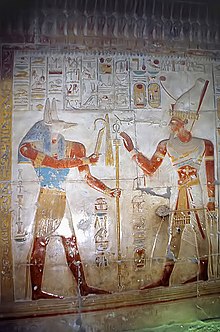Wepwawet
| Wepwawet or Upuaut | |||||
|---|---|---|---|---|---|
| God of War, Victory, Hunting, Lycopolis, Guardian of the Deceased, "Opener of the Ways" and Protector of Pharaoh and Egyptian Army | |||||

Wepwawet giving scepters to Seti I found at Temple of Seti I Wepwawet is often depicted as a bluish or grayish haired wolf or jackal to avoid confusion with Anubis
|
|||||
| Name in hieroglyphs |
|
||||
| Major cult center | Lycopolis | ||||
| Symbol | the mace, hunting arrows | ||||
| Parents | ambiguously either Set, Anubis or Isis | ||||
| Siblings | Anubis | ||||
In late Egyptian mythology, Wepwawet (hieroglyphic wp-w3w.t; also rendered Upuaut, Wep-wawet, Wepawet, and Ophois) was originally a war deity, whose cult centre was Asyut in Upper Egypt (Lycopolis in the Greco-Roman period). His name means opener of the ways and he is often depicted as a wolf standing at the prow of a solar-boat. Some interpret that Wepwawet was seen as a scout, going out to clear routes for the army to proceed forward. One inscription from the Sinai states that Wepwawet "opens the way" to king Sekhemkhet's victory.
Wepwawet originally was seen as a wolf deity, thus the Greek name of Lycopolis, meaning city of wolves, and it is likely the case that Wepwawet was originally just a symbol of the pharaoh, seeking to associate with wolf-like attributes, that later became deified as a mascot to accompany the pharaoh. Likewise, Wepwawet was said to accompany the pharaoh on hunts, in which capacity he was titled (one with) sharp arrow more powerful than the gods alone.
Over time, the connection to war, and thus to death, led to Wepwawet also being seen as one who opened the ways to, and through, Duat, for the spirits of the dead. Through this, and the similarity of the jackal to the wolf, Wepwawet became associated with Anubis, a deity that was worshiped in Asyut, eventually being considered his son. Seen as a jackal, he also was said to be Set's son. Consequently, Wepwawet often is confused with Anubis. This deity appears in the Temple of Seti I at Abydos.
...
Wikipedia
